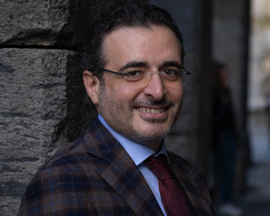Extended abstracts: 15 minutes talks (12 + 3 of Q&A)
Short and Full papers: 20 minutes talks (17 + 3 Q&A)
11:00 – 11:10 Opening Remarks
11:10 – 12:00 Invited Talk: Quantum Evolutionary Algorithms – Giovanni Acampora (Università degli Studi di Napoli)
SESSION 1: Quantum Algorithms
12:00 – 12:20 “Quantum Algorithms for WMC, MPE and MAP” – Fabrizio Riguzzi
12:20 – 12:40 “A polynomial quantum computing algorithm for solving the dualization problem for positive Boolean functions” – Mauro Mezzini, Fernando Lopez Pelayo, Fernando Cuartero Gomez, Jose Javier Paulet Gonzales, Hernan Indibil de La Cruz Calvo and Vicente Pascual
12:40 – 12:55 “Solving Scheduling Problems with Quantum Computing: a Study on Flexible Open Shop” – Marco Baioletti, Angelo Oddi and Riccardo Rasconi
13:00 – 14:00 LUNCH
SESSION 2: QUBO and Quantum Annealers
14:00 – 14:20 “On Using QUBO to Enforce Extensions in Abstract Argumentation” – Marco Baioletti and Francesco Santini
14:20 – 14:35 “A novel approach to face early pandemics using QUBO models” – Stefano Speziali, Andrea Marini, Alessandro Vispa, Federico Bianchi, Massimiliano Proietti, Alberto Garinei, Lorenzo Mattioli, Lorenzo Sani, Emanuele Piccioni and Marcello Marconi
14:35 – 14:50 “Does the structure of the QUBO problem affect the effectiveness of quantum annealing? An empirical perspective” – Riccardo Pellini, Maurizio Ferrari Dacrema and Paolo Cremonesi
SESSION 3: Quantum Machine Learning
14:50 – 15:10 “Coupling quantum classification and quantum distance estimation in continual learning” – Corrado Loglisci and Donato Malerba
15:10 – 15:25 “Quantum Diffusion Models Using Parameterized Quantum Circuits for Data Denoising” – Andrea Cacioppo, Lorenzo Colantonio, Simone Bordoni and Stefano Giagu
15:25 – 15:40 “Quantum circuit noise simulation with reinforcement learning” – Simone Bordoni, Andrea Papaluca, Piergiorgio Buttarini, Alejandro Sopena, Stefano Carrazza and Stefano Giagu
SESSION 4: Synthesis and Compilation of Quantum Circuits
15:40 – 16:00 “Synthesis of CNOT Minimal Quantum Circuits with Topological Constraints Through ASP” – Riccardo Romanello and Carla Piazza
16:00 – 16:30 COFFEE BREAK
16:30 – 16:45 “Benchmarking adaptative Variational Quantum Algorithms on QUBO Instances” – Gloria Turati, Maurizio Ferrari Dacrema and Paolo Cremonesi
16:45 – 17:05 “New coding scheme to compile circuits for Quantum Approximate Optimization Algorithm by genetic evolution” – Lis Arufe, Riccardo Rasconi, Angelo Oddi, Ramiro Varela and Miguel A. González
17:05 – 17:20 “Multiobjective quantum circuit compilation” – Lis Arufe, Miguel A. González, Riccardo Rasconi, Angelo Oddi and Ramiro Varela
17:20 – 17:45 Round Table & Concluding Remarks
Invited Talk
Quantum Evolutionary Algorithms
Giovanni Acampora – Università degli Studi di Napoli

Abstract: The world of computing is going to shift towards new paradigms able to provide better performance in solving hard problems than classical computation. In this scenario, quantum computing is assuming a key role thanks to the recent technological enhancements achieved by several big companies in developing computational devices based on fundamental principles of quantum mechanics: superposition, entanglement, and interference. These computers will be able to yield performance never seen before in several application domains, and the area of bio-inspired optimization may be the one most affected by this revolution. Indeed, on the one hand, the intrinsic parallelism provided by quantum computers could support the design of efficient algorithms for evolutionary computation by enabling the definition of novel concepts such as quantum chromosomes, entangled crossover, and quantum elitism; on the other hand, evolutionary algorithms could be used to reduce the effect of decoherence in quantum computation and make this more reliable. This talk aims at introducing the attendees with this new research area and pave the way towards the design of innovative computing infrastructure where both quantum computing and evolutionary computation take a key role in overcoming the performance of conventional approaches.
